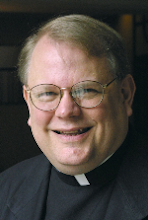
A Homily for the Solemnity of Christ the King
Who is this Christ, who even opponents of monarchy call their King? Who is this Lord, to whom we have given our lives and our devotion? Who is this Jesus at whose name we bend the knee and for whom we long with our every waking breath?
Saint Paul tells us who he is in his letter to the Collosians.
First: He is the image of the invisible God.
No one, as Jesus tells us, has ever seen the Father. But whoever looks upon the Son and believes in him sees God.
He is the image of the invisible God.
Do you remember when Philip says to Jesus, Lord, show us the Father? And do remember Jesus' response. Philip, you have been with me so long and still you do not know me?
He is the image of the invisible God.
He is the word made flesh, the splendor of the Father, Emmanuel, God with us.
He is salvation for the old woman who lives alone with nothing but her fears, and for everyone abandoned by love, life completely out of control. He is the image of the invisible God.
Second: He is the firstborn of all creation.
Before anything is, he was. Through him all things were made. Apart from him, nothing came to be. Which is why his dominion is an everlasting dominion and all creation is subject to him. Do you want to know why God made you? Look to Jesus, for his is the ground of all being and the source of all meaning. Apart from him there is no life or meaning or truth. He is the firstborn of all creation.
He is salvation for the addict who slept on the street last night, and for everyone who is empty, lost, or unsure what you should do. He is the firstborn of all creation.
And third: Through this one who was before all things, all things are held together.
Apart from him there is chaos and dystrophy and death. He is the way, the truth, and the life and nothing holds together except through him. He is the glue that keeps it all from flying apart, the peace which brings joy to men's souls, and the grace which reconciles enemies.
He is salvation for those who are beaten or angry, or frightened or broken. Only he can make them whole.
He is, he was, and he heals. Like he did from the Altar of the Cross. As he opened his arms in a perfect sacrifice of praise, as the blood drained from his body and his consciousness began to fade, he hears the criminals on either side if him begin to scream.
Both were guilty. Both were on their way to hell for murder of fomenting insurrection or worse. And miserable wretches that they were, they appeared to be spending their dying breaths telling others what to do.
The one on his left joins the sneering crowd and reviles Jesus: I thought you were supposed to be the Christ! How ‘out saving yourself, and us too while you're at it!
Notice Jesus never answers to the bad thief. Perhaps he knows this guy who dies cursing God is finally beyond hope. But the other thief does respond, shouting across Jesus: don't you fear God? How can you say such a thing? We're guilty. We deserve what we got! But he's not!
And then he turns to Jesus, and with hi last breath begs him, Jesus, remember me when you come into your kingdom.
And in the next to the last word he would ever speak, Jesus forgives the sins of this lifeline criminal, and assures him: today you will be with me in Paradise.
Jesus forgives the criminal because he knows him. It was through Jesus that he was created and it was to live in the image and likeness of Jesus, the splendor of the image of the invisible God, that he was made.
Jesus forgives the criminal because he loves him, because he desires not the death of the sinner, but that he repent and live, because all it takes to heal a lifetime of sin is a moment of love, for to him who has loved deeply much is forgiven.
And here we are, repentant thieves, the lot of us. Standing before the altar from which our King, who ever was and ever will be, who made us for love and sacrifice and joy, waits for us to have half the faith of the crooks on the cross.
He is a King, he longs to love us, and to lead us home.
Monsignor James P. Moroney
Rector

